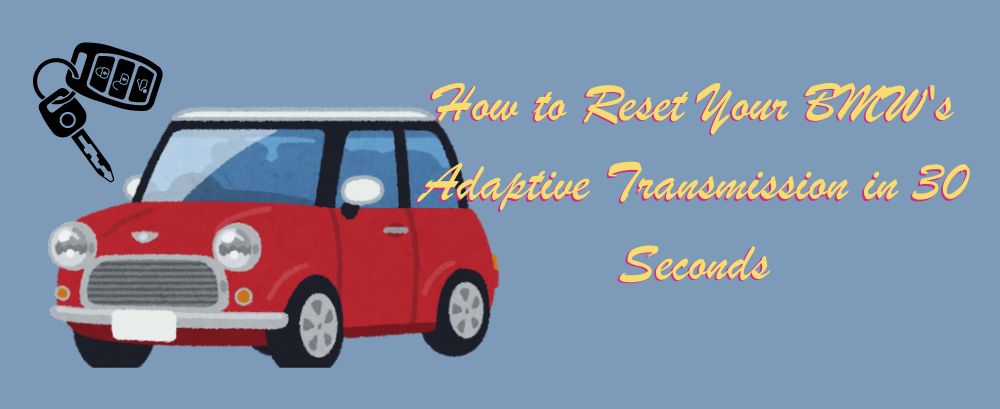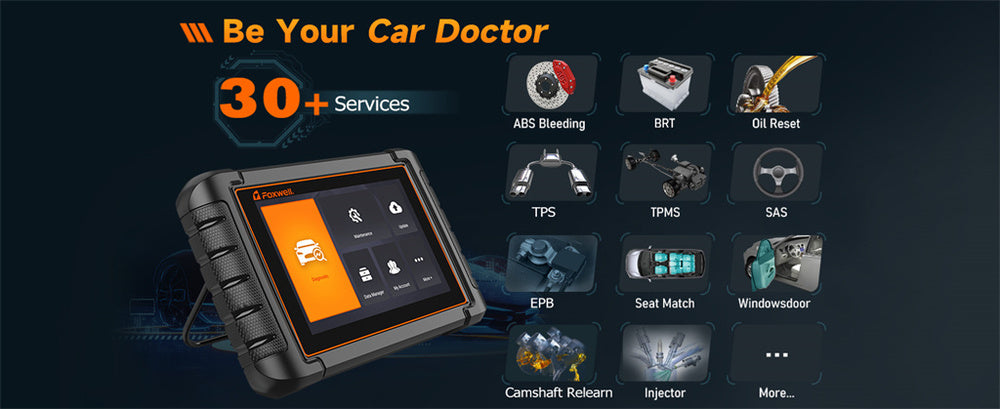"Why is it that every time I see a check engine light, I feel like I’m rolling the dice?"
If you’re responsible for maintaining a fleet of vehicles, especially those mixed with gas-powered and diesel trucks, this is probably a familiar frustration.
Diagnosing problems quickly and efficiently is essential, but finding the right tool to do so can be a challenge. Sure, there are plenty of OBD2 scanners on the market, but are they up to the task for heavy-duty diesel vehicles?
And how many of them actually function without needing Wi-Fi in the middle of a construction site? You don’t have time for guesswork—you need reliable, real-time diagnostics that help you get the job done fast, no matter where you are.
In this article, we’ll explore why traditional OBD2 scanners often fall short and what features the ideal tool needs to offer. Plus, we’ll dive into how brands like Foxwell car Scanner are stepping up to fill the gap for mechanics dealing with both gas and diesel vehicles in the field.
Why Modern Vehicle Maintenance Requires More Advanced OBD2 Scanners

“Why does every check engine light feel like a guessing game?”
If you're the one responsible for maintaining a fleet of diesel and gas vehicles, you’ve probably asked yourself this question more than once. Every time that little light pops up, it’s like being handed a puzzle with half the pieces missing.
You’re out in the field, juggling multiple vehicles, and time is money. The last thing you need is to waste hours manually diagnosing problems that could have been solved in minutes with the right tool.
But here’s the catch—most OBD scanners on the market, while decent for basic gas-powered cars, just don’t cut it when it comes to heavy-duty diesel trucks.
Why? Because diagnosing a diesel vehicle often requires more than just a generic code reader. It needs real-time data, specialized diagnostics, and, ideally, a tool that works offline when you’re miles away from the nearest Wi-Fi connection.
So, what should you be looking for in an OBD scanner to make these headaches go away for good? Let’s break it down.
Common Limitations of OBD Scanners on the Market
If you’ve already spent hundreds on a scanner that works fine for your personal car but struggles with your fleet of diesel trucks, you’re not alone. Many tools are marketed as “all-in-one” solutions, but once you try them on a diesel vehicle, they fall short.
They either can’t read the necessary codes, or they provide minimal data, leaving you back at square one, guessing at what might be wrong.
Another common frustration is the need for internet connectivity. Many advanced scanners require a Wi-Fi connection to pull up certain features or diagnostics.
But if you’re working in a remote area, miles from any signal, that scanner becomes just another piece of dead weight in your toolbox.
What Features Should the Ideal OBD Scanner Have?
At this point, you might be wondering what separates a basic OBD scanner from one that can truly meet your needs. Here’s a list of features you should consider if you want to cut down on diagnostic time and guesswork:
Broad Vehicle Compatibility: Whether it’s a diesel truck, a gas vehicle, or even something in between, your scanner needs to handle them all. There’s no point in buying a tool that can’t read half the vehicles you’re responsible for.
Comprehensive Data Access: Basic scanners might give you a generic fault code, but what about the deeper data? You need access to real-time information like fuel trims, sensor data, and engine status to accurately diagnose problems and avoid guessing games.
Offline Functionality: If you’re frequently working in areas without internet access, this is a must. A good OBD scanner should work just as effectively in the middle of a construction site as it does in a garage.
Ease of Use: Even the most advanced features are useless if they’re hidden behind a complicated interface. You want a tool that’s intuitive, straightforward, and gets you answers quickly.
Durability: Your tools have to withstand harsh environments. Whether it’s being tossed in the back of a truck or exposed to tough weather, your OBD scanner should be as rugged as the vehicles you’re working on.
Foxwell: A Solution for Diesel and Gas Vehicle Diagnostics
Enter Foxwell, a brand that’s designed its tools with mechanics like you in mind. While many OBD scanners on the market are tailored for basic passenger vehicles, Foxwell’s products cover a wider range, including heavy-duty diesel trucks, and offer the kind of advanced diagnostics you need for your day-to-day operations.
For instance, take the Foxwell NT1009. This is an automotive battery tester that ensures you’re not just diagnosing engine issues but can also quickly pinpoint battery-related problems.
Whether a vehicle won’t start or is experiencing electrical issues, the NT1009 offers immediate results on battery health, charge level, and cranking capacity. It’s an incredibly useful tool for saving time by eliminating unnecessary replacements and focusing on the real problem.
With its simplicity and accuracy, you can rely on it to provide fast, reliable diagnostics in the field.
Meanwhile, the Foxwell NT809 is your go-to tool for comprehensive system diagnostics. Whether you’re dealing with engine issues, ABS faults, or SRS problems, the NT809 lets you scan all major systems with ease.
It provides real-time data like fuel trims, sensor readings, and engine performance metrics. You can also access advanced features like oil resets, EPB service, and SAS calibration—all in one device.
The NT809’s intuitive touch-screen interface makes navigating these powerful features simple, ensuring you don’t lose time figuring out the tool when you should be fixing the vehicle.
How Foxwell OBD2 Scanners Can Improve Efficiency
So how exactly do tools like the Foxwell NT1009 and Foxwell NT809 make your life easier? First, let’s talk about efficiency. These scanners are designed to save you both time and effort, helping you cut down on diagnostic hours that could otherwise drag on due to trial and error.
Take the Foxwell NT1009, for example. This automotive battery tester ensures you’re not just diagnosing engine issues, but also quickly pinpointing battery-related problems.
It’s perfect for those moments when a vehicle refuses to start, and you’re left wondering if it’s the battery, alternator, or something else entirely.
With the NT1009, you get immediate results, including information on the battery’s health, charge level, and even its cranking capability.
This not only saves time but also helps you avoid unnecessary replacements and costs. Plus, it’s incredibly easy to use, making it a go-to tool when you need fast, reliable diagnostics in the field.
Now, let’s look at the Foxwell NT809, a versatile tool that offers full system diagnostics for both gas and diesel vehicles. Whether you're dealing with ABS, SRS, or engine issues, the NT809 allows you to scan all major systems and access real-time data, such as fuel trim, sensor readings, and engine performance metrics.
This means no more guessing—just precise diagnostics that help you get to the root of the problem quickly.
The NT809 also offers live data streams, graphing capabilities, and even support for advanced features like oil reset, EPB service, and SAS calibration. This makes it ideal for handling a wide range of issues across multiple vehicles without the need for additional equipment.
And because it’s user-friendly with a touch-screen interface, you can perform these advanced diagnostics without needing to be a tech expert.
Both of these tools, whether it's the NT1009 for battery-related issues or the NT809 for comprehensive system diagnostics, are designed to streamline your workflow, reduce vehicle downtime, and give you the confidence to tackle both gas and diesel vehicle problems efficiently.
Real-World Performance: Foxwell Tools in the Field
Let’s be real: It’s one thing to hear about a tool’s features, but what matters most is how it performs under pressure, especially in tough conditions. Foxwell GT60 Plus is another model designed for exactly this purpose.
Built for rugged environments, it’s equipped with a durable exterior and a long-lasting battery, so you don’t have to worry about it dying halfway through a job in the middle of nowhere.
Take it from a mechanic who was stuck on a remote job site with a diesel truck that refused to start. His existing scanner gave him no useful data, but when he switched to the Foxwell tool, it quickly identified a fuel system issue.
The problem was fixed within minutes, saving him hours of downtime and keeping the job on schedule.

Conclusion
Investing in the right OBD scanner is more than just a convenience—it’s a way to streamline your work, reduce downtime, and increase efficiency across your fleet.
Foxwell’s scanners, designed with both gas and diesel vehicles in mind, offer real-time data, offline functionality, and rugged durability, making them perfect for those working in challenging environments.
Rather than guessing at what’s wrong when the check engine light comes on, you can rely on tools like the Foxwell NT1009 and NT809 to give you accurate diagnostics quickly.
At the end of the day, a good scanner is an investment in your own productivity. By choosing a tool that meets the demands of both diesel and gas vehicles, you’ll save time, money, and frustration—and that’s something every mechanic can appreciate.
FAQs
Will a regular OBD2 scanner work on diesel?
Most regular OBD2 scanners are designed for gas vehicles and may not fully support heavy-duty diesel vehicles. You need a specialized scanner like the Foxwell NT809 for full diesel compatibility.
Do OBD-II scanners work on all cars?
Not all OBD-II scanners work on every type of vehicle. Some only support gas cars, while more advanced scanners, like the Foxwell NT809, work on both gas and diesel vehicles.
What OBD scanners do mechanics use?
Mechanics often use professional-grade scanners that offer comprehensive diagnostics for multiple vehicle types. Tools like the Foxwell NT809 are popular for their versatility and advanced features.




Leave a comment
This site is protected by hCaptcha and the hCaptcha Privacy Policy and Terms of Service apply.